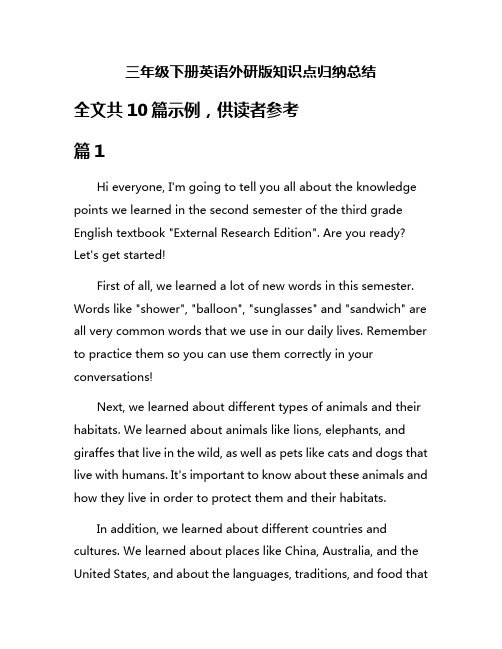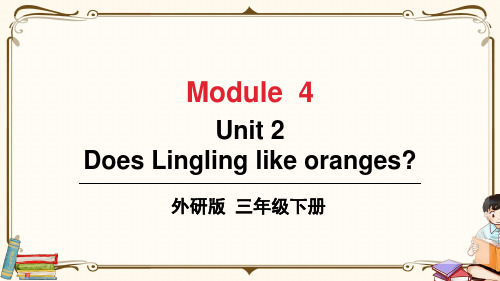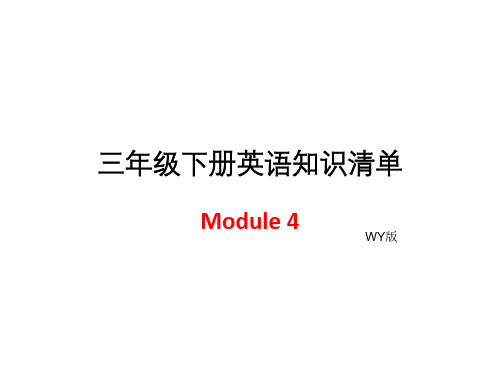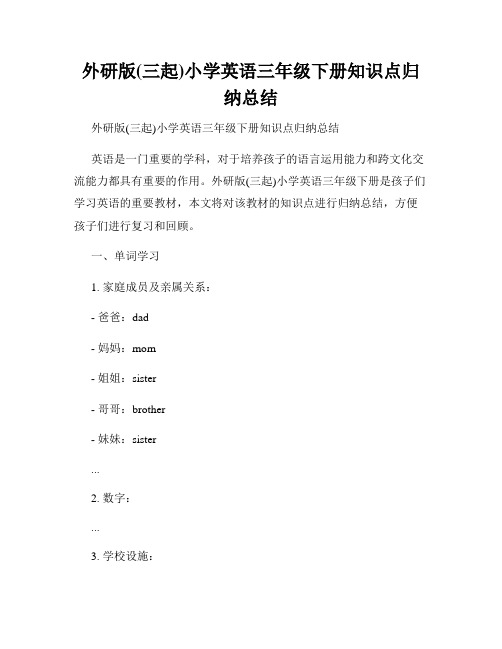外研版三年级英语下册第四模块知识点
三年级下册英语外研版知识点归纳总结

三年级下册英语外研版知识点归纳总结全文共10篇示例,供读者参考篇1Hi everyone, I'm going to tell you all about the knowledge points we learned in the second semester of the third grade English textbook "External Research Edition". Are you ready? Let's get started!First of all, we learned a lot of new words in this semester. Words like "shower", "balloon", "sunglasses" and "sandwich" are all very common words that we use in our daily lives. Remember to practice them so you can use them correctly in your conversations!Next, we learned about different types of animals and their habitats. We learned about animals like lions, elephants, and giraffes that live in the wild, as well as pets like cats and dogs that live with humans. It's important to know about these animals and how they live in order to protect them and their habitats.In addition, we learned about different countries and cultures. We learned about places like China, Australia, and the United States, and about the languages, traditions, and food thatare unique to each country. It's important to be open-minded and respectful of different cultures and customs.Finally, we learned about telling time and different daily routines. We learned how to tell the time using both digital and analog clocks, and how to talk about what we do at different times of the day. It's important to be able to communicate about our daily activities in English.Overall, we learned a lot of new and interesting things in the second semester of the third grade English textbook "External Research Edition". I hope you all enjoyed learning with me and that you continue to practice and improve your English skills. Keep up the good work, everyone!篇2Hello everyone! Today, I'm going to share with you all the important knowledge points we learned in the second half of third grade in our English textbook - "Oxford New Standard English".1. Let's start with vocabulary. In this semester, we learned a lot of new words such as animals, colors, fruits, vegetables, and family members. Remember to review them regularly so you don't forget!2. Next, we learned about different actions and verbs. We learned how to use verbs in present tense, past tense, and future tense. For example, "I run", "I ran", and "I will run".3. We also learned about different places and directions. We learned how to use prepositions like "in", "on", "under", "next to" to describe where things are located.4. In this semester, we also learned how to tell time in English. Remember to practice telling the time using both the digital clock and the traditional clock with hour and minute hands.5. Another important knowledge point we learned is how to use adjectives to describe things. Adjectives are words that describe nouns. For example, "a big elephant", "a red apple".6. We also learned about the days of the week, the months of the year, and the seasons. Remember to practice spelling and saying them correctly.7. Finally, we learned about basic sentence structures and grammar rules. Remember to use the correct subject-verb agreement and word order in sentences.I hope this summary of our English knowledge points from the second half of third grade is helpful to you. Keep practicingand reviewing, and you'll continue to improve your English skills! Good luck, everyone!篇3Hello everyone! Today I'm going to talk about the knowledge points we have learned in the third grade English textbook of Foreign Language Teaching and Research Press.First of all, we have learned a lot of new words and phrases in this textbook. We have learned about animals, food, colors, numbers, and many other topics. It's important to remember these words and how to use them in sentences.Next, we have learned grammar rules like simple present tense, present continuous tense, and past tense. It's essential to use the right tense when we speak or write English sentences.Moreover, we have practiced reading and writing in English. We have read interesting stories, dialogues, and passages to improve our reading skills. We have also written sentences, paragraphs, and short stories to enhance our writing skills.In addition, we have learned how to ask and answer questions in English. We have practiced using question wordslike who, what, where, when, why, and how. It's important to ask questions to understand more about a topic.Furthermore, we have learned about the different parts of speech such as nouns, pronouns, verbs, adjectives, adverbs, prepositions, and conjunctions. Understanding these parts of speech helps us to construct sentences correctly.Lastly, we have practiced listening and speaking in English. We have listened to conversations, songs, and instructions to improve our listening skills. We have also participated in group discussions, role plays, and presentations to enhance our speaking skills.In conclusion, we have learned a lot of valuable knowledge points in the third grade English textbook of Foreign Language Teaching and Research Press. It's essential to review and practice these points regularly to become more proficient in English. Keep up the good work, everyone! Let's continue to learn and improve our English skills together!篇4Oh boy, it's time to summarize what we've learned in the second semester of the third grade English class! Let's dive in and remember all the fun stuff we've covered.First up, we learned a lot of new words in this semester. Words like "family", "friends", "colors", "food", and "animals" were all part of our vocabulary. We also learned how to use simple sentences to talk about these topics, like "My family is big" or "I like red apples". It was so cool to be able to express ourselves in English!Next, we talked a lot about grammar. We learned about verbs, adjectives, and prepositions. Verbs are action words, like "run" or "jump". Adjectives describe things, like "big" or "happy". And prepositions show the relationship between objects, like "on" or "under". It was a bit tricky at first, but we got the hang of it eventually.We also practiced a lot of reading and writing in this semester. We read simple stories and answered questions about them. We also wrote short paragraphs about our favorite things, like our pets or our favorite foods. It was really fun to see how much our writing improved over the semester.In addition, we learned how to have simple conversations in English. We practiced introducing ourselves, asking and answering questions, and talking about our likes and dislikes. It was so cool to be able to have a conversation with our classmates in English!Overall, this semester was packed with lots of new knowledge and skills. We learned so much about vocabulary, grammar, reading, writing, and conversation. We had a blast practicing our English skills and we can't wait to keep learning and improving in the next semester. English class rocks!篇5Dear friends,I'm going to tell you all about the knowledge points we learned in the second semester of Grade 3 English Outside Research Edition. Let's dive in!First, we learned about different types of animals, like birds, mammals, reptiles, amphibians, and fish. We also learned about their habitats and what they eat. It was so cool to learn about all the different animals in the world!Next, we learned about the weather and different seasons. We learned about the four seasons – spring, summer, autumn, and winter. We also learned about different types of weather, like sunny, rainy, cloudy, and snowy. I love learning about the weather because it helps me understand why we have different seasons.We also learned about sports and activities we can do. We learned about popular sports like football, basketball, and swimming. We also learned about hobbies like drawing, dancing, and reading. It's important to stay active and have fun, so learning about sports and activities was really fun!Another thing we learned about was transportation. We learned about different types of vehicles like cars, buses, trains, and planes. We also learned about road safety and how to be safe when using transportation. It's important to know how to be safe when traveling, so this was a really good lesson.Lastly, we learned about famous landmarks around the world. We learned about landmarks like the Eiffel Tower in Paris, the Great Wall of China, and the Statue of Liberty in New York. It was so cool to learn about these amazing places and the history behind them.Overall, we learned so many interesting things in Grade 3 English this semester. I had a lot of fun learning about animals, weather, sports, transportation, and landmarks. I can't wait to learn even more in Grade 4!That's all for now. See you next time!Love,[Your Name]篇6Hello everyone! I'm so excited to share with you all the knowledge points from the English textbook in the third grade. Let's break it down together!Unit 1: My School DayIn this unit, we learned about daily routines and time expressions. We also practiced using simple present tense to talk about what we do every day. Remember to use words like "I wake up at 7 o'clock" or "I go to bed at 10 o'clock".Unit 2: My FamilyIn Unit 2, we talked about family members and practiced describing people's appearances. Don't forget to use adjectives like "tall", "short", "young", and "old" to describe your family members.Unit 3: My HobbiesThis unit was all about hobbies and activities. We learned how to talk about what we like doing in our free time. You can say "I like playing football" or "I enjoy reading books".Unit 4: My Free TimeIn Unit 4, we learned how to talk about our daily activities using adverbs of frequency. Remember to use words like "always", "usually", "sometimes", and "never" to describe how often you do something.Unit 5: My Home TownThis unit focused on describing places in our hometown. We practiced using prepositions of place like "in", "on", and "under" to talk about where things are located.Unit 6: My ClothesIn Unit 6, we learned about different types of clothing and how to describe what we are wearing. You can say "I am wearing a blue T-shirt" or "I have a red dress".Unit 7: My WeekendUnit 7 was all about weekend activities. We practiced using simple past tense to talk about what we did last weekend. Make sure to add "-ed" to regular verbs, like "played", "watched", and "visited".Unit 8: My PetsIn the last unit, we talked about pets and animals. We learned how to use possessive pronouns like "my", "your", "his", and "her" to talk about who owns something.That's a wrap for all the knowledge points in the third grade English textbook. I hope this summary helps you remember everything we learned this year. Keep practicing and see you next year!篇7Hi everyone, I'm a third-grade student and I am here to share with you a summary of the knowledge points we have learned in the second semester of the English book "Experiencing English".In this semester, we have learned a lot of new things such as:1. **Vocabulary**: We have expanded our vocabulary by learning new words related to different topics like animals, food, colors, and family members. Remember to practice these words regularly to improve your English skills.2. **Grammar**: We have learned about different grammar rules such as present continuous tense, past simple tense, andcomparatives and superlatives. It's important to understand these rules to form correct sentences.3. **Reading comprehension**: We have practiced reading short passages and answering questions to improve our reading skills. Remember to pay attention to the details in the passage to answer the questions correctly.4. **Writing**: We have practiced writing short sentences and paragraphs about topics like our favorite hobbies, holidays, and daily routines. Remember to use proper punctuation and grammar while writing.5. **Listening**: We have listened to audio clips and practiced listening to spoken English to improve our listening skills. It's important to listen carefully to understand the content.6. **Speaking**: We have practiced speaking in English by participating in classroom activities and group discussions. Remember to speak confidently and practice speaking English with your friends and family.Overall, this semester has been filled with new and exciting challenges that have helped us improve our English skills. Let's continue to practice and learn more in the next semester. Keep up the good work, everyone!篇8Hey guys, I'm gonna tell you all about what we learned in the second semester of third grade English class with the Oxford English Primary Course!First off, we learned a lot of new words and phrases. We learned how to talk about our daily routines, like "I get up at seven o'clock" or "I brush my teeth before I go to bed." We also learned how to describe things using adjectives, like "The cat is fluffy" or "The cake is delicious." And we learned about different types of animals and the sounds they make, like "The cow says moo" or "The duck says quack."Next, we learned about different parts of the body. We learned how to say where things are located, like "My eyes are above my nose" or "My mouth is below my eyes." We also learned how to talk about feelings and emotions, like "I am happy" or "I am sad."We also learned about telling time. We learned how to say the time using both digital and analog clocks, like "It is teno'clock" or "It is half past nine." We also learned about daily activities and the times we do them, like "I have breakfast at eight o'clock" or "I go to bed at nine o'clock."Finally, we learned about different types of weather. We learned how to talk about the weather using simple phrases, like "It is sunny" or "It is rainy." We also learned how to talk about seasons, like "It is winter" or "It is summer."Overall, we learned a lot of new words and phrases in the second semester of third grade English class. We had so much fun learning and practicing our English skills, and we can't wait to learn even more next semester!篇9In the second semester of the third grade, we learned a lot of interesting things in English class. I'm going to summarize all the knowledge points for you now!First of all, we studied different types of animals, such as mammals, birds, fish, reptiles, and amphibians. We learned about their characteristics and habitats. For example, mammals have fur or hair, birds have feathers, and fish have scales. It's so cool to learn about all these animals!We also learned about the four seasons: spring, summer, autumn, and winter. Each season has its own weather and activities. In spring, flowers bloom and birds sing. In summer, it's hot and sunny, so we can go swimming. In autumn, the leaveschange color and fall off the trees. And in winter, it snows and we can make snowmen. I love all the seasons!Next, we studied different types of food and drinks. We learned about fruits, vegetables, meat, and dairy products. We also learned about healthy eating habits and the importance of drinking water. It's important to eat a balanced diet to stay healthy and strong.We also learned about telling time and the days of the week. We practiced saying the days of the week and telling the time using both analog and digital clocks. It's fun to learn how to read the clock and know what time it is.In addition, we learned about some common occupations, such as doctor, teacher, police officer, and firefighter. We learned about the duties and responsibilities of each job. It's interesting to learn about different careers and how they help people in our community.Overall, the second semester of the third grade English class was full of fun and exciting knowledge points. I can't wait to learn more in the next semester!篇10Hey guys! Today I'm gonna talk about all the stuff we learned in the second semester of third grade English class. Are you ready? Let's go!In this semester, we learned a lot of new things in English. We learned about different places like the zoo, the supermarket, and the post office. We also learned how to give directions and talk about our daily routines. It was super fun!One of the things we learned was how to use prepositions like in, on, under, and next to. We also learned about the present continuous tense, like "I am playing" or "She is reading". It was a little tricky at first, but we got the hang of it.We also learned about different types of animals and their habitats. We learned about lions, tigers, and elephants. We even learned about some cool sea animals like dolphins and octopuses. It was so cool to learn about all the different animals around the world!Another thing we learned about was food. We learned about fruits, vegetables, and different kinds of snacks. We even learned how to order food at a restaurant. It was yummy to talk about all the different foods we like to eat!Overall, this semester was super fun and we learned a lot of new things. I can't wait to see what we'll learn next semester in fourth grade English class. Thanks for listening, guys! See you next time!。
外研版三年级英语下册 Module 4 Unit 2 教学课件

Let’s say
A: Do you like _a_p_p_l_es_? B: Yes, I do.
A: Do you like _p_e_a_rs_? B: Yes, I do.
➢ Act out the dialogues with your partner. ➢ Learn to sing the chant and know more food.
rice 米饭 meat 肉 noodles 面条 食物
fish 鱼肉;鱼 milk 牛奶 apple 苹果 banana 香蕉 orange 橙;柑;橘 pear 梨
apple
banana
pear
does
orange
doesn’t =does not
1 Listen, point and say.
Do you like meat?
Yes, I do.
Do you like noodles?
Yes, I do.
Do you like apples?
Yes, I do.
A: Do you like _o_r_a_n_g_e_s_? B: No, I don’t.
A: Do you like _b_a_n_a_n_a_s_? B: No, I don’t.
Let’s play
Does he/she
…
like…?
Make a dialogue
A: Let’s buy some fruit. B: OK! A: Do you like _____? B: No, I don’t. I like ____. A: Here you are. B: Thanks. Do you like ____? A: Yes, I do.
外研版三年级英语下册全册知识要点综合复习资料

外研版三年级英语下册全册知识要点综合复习资料外研版三年级英语下册全册知识要点综合复习资料【 Module 1 】1. -What ’ s your favourite colour ?你最喜欢的颜色是什么?-My favourite colour is yellow. 我最喜欢的颜色是黄色。
colour 颜色 :(red 、 blue 、black 、 white 、 green 、 orange 、 brown)2. -What ’ s your favourite song? 你最喜欢的歌曲是什么?-It ’ s the ABC song. 是字母歌。
3. -Here you are. 给你。
-Thank you. 谢谢。
【 Module 2 】1. -What ’ s this? 这是什么? -It ’ s a tiger . 这是一只老虎。
animal 动物 :(monkey 、 lion 、 panda 、 an elephant 、 cat 、 dog)2. -What are they ?它们是什么? -They ’ re tigers . 它们是老虎。
(monkeys 、lions 、 pandas 、 elephants)3. That man is short. 那个男人很矮。
It is big and tall . 它又大又高。
(tall 、 short 、 big 、 small 、fat 、 thin)【 Module 3 】1. I like football . 我喜欢足球。
sport 运动:(morning exercises 、 table tennis 、basketball)I don ’ t like football . 我不喜欢足球。
sport 运动 :(swimming 、skipping 、 riding my bike)【 Module 4 】1. -Do you like meat ? 你喜欢肉吗? -Yes, I do. /No, I don ’ t. food 食物:(meat 、rice 、fish 、milk 、noodles) fruit 水果 :(pears 、 bananas 、 oranges 、 apples)2.-Does Sam like pears ?萨姆喜欢梨吗? -Yes, he does. /No, he doesn ’ t.-Does Amy like pears ? 埃米喜欢梨吗 ? -Yes, she does. /No, she doesn ’ t. food 食物 :(meat 、 rice 、 fish 、 milk 、 noodles ) fruit 水果 :(pears 、bananas 、oranges 、 apples)3. -Pass me the rice, please! 请递给我米饭。
三年级下册英语模块知识清单-Module 4 ∣外研社(三起) (7页ppt)

—Yes, she does./No, she doesn't. 是的,她喜欢。/不,她不喜欢。
重点句型
3.—Does your mother like rice? 你妈妈喜欢米饭吗?
—Yes, she does./No, she doesn't. 是的,她喜欢。/不,她不喜欢。
•
5 、幼儿园组织丰富多彩的活动,让 幼儿得 到快乐 体验。 如,各 班主题 活动展 示、亲 子活动 、庆十 一、迎 中秋等 系列活 动。
•
6.观察图画内容,使学生初步了解学 校生活 、自己 的国家 、民族 、,感 受教师 的亲切 ,同学 的友爱 ,语文 学习的 快乐。 校园生 活的丰 富多彩 。
•
7.依据画面提示,对学生进行热爱祖 国、热 爱学习 、遵守 纪律、 团结友 爱等方 面的入 学常规 教育和 良好学 习习惯 的养成 教育。
12.does do 的第三人称单数形式
13.pear
梨
14.doesn't=does not 不
15.mm
呣
重点短语
rice 递给我米饭
重点句型
1.—Do you like fish? 你喜欢鱼肉吗?
—Yes, I do./No, I don't. 是的,我喜欢。/不,我不喜欢。
•
3 、创设体现班级特色的主题环境。 在主题 环境的 设置和 提供上 ,我们 应本着 以幼儿 为主体 的宗旨 ,鼓励 幼儿大 胆参与 到环境 创设中 ,要重 视环境 随教学 内容的 变化而 随时调 整,让 环境体 现幼儿 的学习 过程, 使环境 始终起 到引导 幼儿发 展的作 用。
三年级下册英语教案-Module 4第二课时Unit 1 3~4 外研版(三起)

三年级下册英语教案-Module 4第二课时Unit 1 3~4 外研版(三起)教学内容三年级下册英语教案-Module 4第二课时Unit 1 3~4,主要内容包括以下部分:1.生词和短语2.句型和语法3.听力训练4.口语练习5.读写训练教学目标通过本课的学习,学生能够掌握以下内容:1.能正确读写单词cake, sweets, strawberries等生词。
2.能理解与运用句型:Would you like some cake? / Yes, please. / No, thank you.等。
3.能听懂询问以及回答是否要食物的问题,并能正确运用。
4.能在对话中熟练运用被动语态。
教学步骤1.先通过小组讨论的方式,让学生介绍一下自己喜欢的食物,扩展他们的英语词汇量。
2.讲授词汇和短语,包括cake, sweets, strawberries等,让学生熟练掌握这些单词的读音和意思。
3.教授句型Would you like some cake? / Yes, please. / No, thank you.等常用句型,让学生知道如何礼貌的回答别人的邀请。
4.听录音,练习句型Would you like some cake? / Yes, please. / No, thank you.等的发音和语调。
5.教授被动语态,让学生熟悉其构造和用法。
6.进行口语练习,让学生模拟在甜点店点餐的场景,使用刚才所学的句型表达。
7.进行听力练习,让学生听询问以及回答是否要食物的问题,并进行回答,加深对话交流的能力。
8.进行读写练习,让学生读写有关甜点的文章和对话。
教学重点和难点教学重点:1.能正确读写单词cake, sweets, strawberries等生词。
2.能理解与运用句型:Would you like some cake? / Yes, please. / No, thank you.等。
3.能在对话中熟练运用被动语态。
外研版(三起)小学英语三年级下册知识点归纳总结

外研版(三起)小学英语三年级下册知识点归纳总结外研版(三起)小学英语三年级下册知识点归纳总结英语是一门重要的学科,对于培养孩子的语言运用能力和跨文化交流能力都具有重要的作用。
外研版(三起)小学英语三年级下册是孩子们学习英语的重要教材,本文将对该教材的知识点进行归纳总结,方便孩子们进行复习和回顾。
一、单词学习1. 家庭成员及亲属关系:- 爸爸:dad- 妈妈:mom- 姐姐:sister- 哥哥:brother- 妹妹:sister...2. 数字:...3. 学校设施:...4. 动物:...二、语法学习1. 句型- 主语+动词- 主语+be动词+形容词2. 疑问句- 一般疑问句:动词/动词短语+主语?- 特殊疑问句:疑问词+一般疑问句三、句子构成1. 基本句型- I am a student.- She is my sister.2. 特殊句型- What's your name?- How old are you?四、情境会话1. 问候与介绍- Hello, good morning/afternoon/evening.- What's your name?- My name is...2. 日常生活用语- Thank you/You're welcome.- See you later.五、阅读理解1. 阅读文章并回答问题- 根据文章内容回答问题。
六、综合练习1. 完成句子- 根据图片或提示补全句子。
2. 选择正确答案- 根据问题选择适当的答案。
以上是对外研版(三起)小学英语三年级下册的知识点进行的归纳总结,通过复习这些知识点,帮助孩子们巩固已学知识,提高英语表达能力和语言理解能力。
希望孩子们能够在学习英语的过程中不断进步!。
外研版三年级下册unit4 feeling
我很开心/我很伤心
angry happy scared tired sad
4
c r y 哭泣 s m i l e 微笑 Stamp his feet 跺脚 goes to sleep去睡觉
5
Happy birthday,Mike. 生日快乐,Mike。 Thank you.Dad. 谢谢,爸爸。
12Βιβλιοθήκη LOGO作者:Rhea
伤心的
高兴的
生气的
疲劳的
害怕的
重点句子
How are you (today)?
你(今天)过得好吗?
很好/一般
I'm fine. / I'm OK.
Alice is Happy. 爱丽丝很开心。 How are you feeling (today)?
你(今天)感觉怎么样?
I'm happy. / I'm sad.
6
I'm sorry.Dad. The game isn't stupid. I was angry. 对不起,爸爸。这个游戏 不愚蠢。我当时生气了。 That's OK,Mike. 没关系,Mike。 Let's play the game. 我们一起玩游戏吧。 OK! 好的
7
Match
I've got a new present.I The game is stupid.Mike She is sad. He is happy.
15
fifteen
16
sixteen
17
seventeen
18
eighteen
19
nineteen
20
twenty
外研版三年级英语下册第四模块知识点
三年级英语下册第四模块知识点一、单词::meat肉pass传递rice 米饭noodles面条fish鱼肉but但是milk牛奶does do 的第三人称单数形式orange橙,柑,橘apple苹果banana 香蕉pear梨doesn't=does not不二、短语:1、pass me the rice 把米饭递给我2、Here you are 给你二、句型:1、Pass me the rice ,please .请把米饭递给我。
【pass sb.sth.把某东西递给某人】再如:Pass him the book .把那本书递给他。
2、Here you are ,mum .给你,妈妈。
【Here you are 在这里是“给你”的意思,】3、Do you like meat ,Lingling ? Yes ,I do ./No ,I don`t .玲玲,你喜欢肉吗?是的,我喜欢/不,我不喜欢。
【like变一般疑问句时,需要用助动词“do”来帮助,把“do”提前放在句首。
回答时,也要用“do”的肯、否定形式。
“don`t”=do not】再如:Do you like fish ,Amy ?No,I don`t .艾米,你喜欢鱼吗?不,我不喜欢。
4、Look!Tom likes milk .看,汤姆喜欢牛奶。
【当主语是第三人称单数时(he、she、it、名字等),like后要加“s”的。
】再如:Daming likes bananas,and Tingting likes oranges . 大明喜欢香蕉,婷婷喜欢橘子。
5、Does Daming like bananas ?Yes ,he does ./No,he doesn`t大明喜欢香蕉吗?是的,他喜欢。
/不,他不喜欢。
【当主语是第三人称单数时,like变一般疑问句时,需要用助动词“does”,这时的like后面再不能加“s”了,回答时,也要用“does”的肯、否定形式。
外研社(三年级起)英语三年级下册第4单元重点知识点汇总
Module 4重点知识汇总一、词汇meat肉pass传递rice米饭;米mum妈妈noodles面条fish鱼肉;鱼but但是milk牛奶does(do的第三人称单数形式)orange橙;柑;橘apple苹果banana香蕉pear梨doesn't = does not 不二、句子1. Please pass me the rice. 请把米饭递给我。
2. Here you are. 给你。
3. Thank you. 谢谢你。
4. I like noodles. 我喜欢面条。
5. —Do you like meat? 你喜欢肉吗?—Yes, I do. 是的,我喜欢。
6. —Do you like fish? 你喜欢鱼吗?—No, I don’t. 不,我不喜欢。
7. —Does Lingling like oranges? 玲玲喜换橙子吗?—Yes, she does. 是的,她喜欢。
三、句型结构①询问对方是否喜欢某物—Do you like ...?—Yes, I do. / No, I don’t.eg: —Do you like rice? (你喜欢米饭吗?)—Yes, I do. (是的,我喜欢。
)—Do you like apples? (你喜欢苹果吗?)—No, I don’t. (不,我不喜欢。
)②询问他人(第三人称单数)是否喜欢某物—Does + 主语(第三人称单数)+ like ...?—Yes, 主语+ does. / No, 主语+ doesn't.eg: —Does Amy like oranges? (艾米喜欢橙子吗?)—Yes, she does. (是的,她喜欢。
)—Does Bob like bananas? (鲍勃喜欢香蕉吗?)—No, he doesn’t. (不,他不喜欢。
)。
三年级下册英语外研版第四模块课文
三年级下册英语外研版第四模块课文---一、课文概述本模块的课文主要围绕着日常生活中的一些简单情景展开,内容贴近学生的生活实际,又涉及到一些基本的英语交际能力。
教学目标旨在培养学生的英语口语能力,提高学生的自主学习能力,激发他们学习英语的兴趣。
二、词汇与句型1. 本模块课文中包含一些日常生活中常用的词汇,如颜色、食物、动作等,句型也相对简单,适合三年级学生的理解和掌握。
2. 通过学习这些词汇和句型,学生能够在日常的交际中运用所学的知识,提高自己的英语口语表达能力,增强英语应用能力。
三、阅读与表达1. 本模块的课文内容生动有趣,情节简单,适合学生阅读。
2. 通过课文的学习,可以引导学生进行表演、朗读等活动,提高他们的口语表达和情感表达能力。
四、教学建议1. 在教学时要结合学生的实际情况来展开,引导学生多举一些生活中的例子,并帮助他们将所学的知识与实际生活相通联。
2. 在教学过程中,要适当使用各种教学手段和方法,比如图片、故事、游戏等,激发学生的学习兴趣,让他们更好地理解和掌握所学的内容。
3. 教师还可以设计一些小组活动,如角色扮演、情景对话等,让学生在模拟情景中运用所学的知识,提高他们的口语交际能力。
五、课文意义本模块的课文内容浅显易懂,贴近学生的生活实际,通过学习,可以帮助学生提高他们的英语交际能力,培养他们的英语学习兴趣,为以后的学习打下良好的基础。
三年级下册英语外研版第四模块课文内容简单易懂,贴近学生的生活实际,通过学习可以促使学生提高他们的口语表达能力,增强他们的英语应用能力,为今后的学习打下坚实的基础。
在教学过程中,老师需要注重学生的实际情况,结合学生的生活经验展开教学,适当引入各种教学手段和方法,激发学生的学习兴趣,引导学生在轻松愉快的氛围中学习英语。
对于三年级下册英语外研版第四模块的课文,我们可以进一步扩展教学内容,以提高学生的英语口语表达能力和阅读能力。
以下是一些建议和想法:六、课堂活动设计1. 语言游戏:可以设计一些有趣的语言游戏,比如颜色大富翁、食物连连看等,让学生在语言游戏中加深对词汇的记忆,提高他们的词汇应用能力。
- 1、下载文档前请自行甄别文档内容的完整性,平台不提供额外的编辑、内容补充、找答案等附加服务。
- 2、"仅部分预览"的文档,不可在线预览部分如存在完整性等问题,可反馈申请退款(可完整预览的文档不适用该条件!)。
- 3、如文档侵犯您的权益,请联系客服反馈,我们会尽快为您处理(人工客服工作时间:9:00-18:30)。
三年级英语下册第四模块知识点
一、单词::meat肉pass传递rice 米饭noodles面条fish
鱼肉
but但是milk牛奶does do 的第三人称单数形式orange橙,柑,橘
apple苹果banana 香蕉pear梨doesn't=does not不
二、短语:
1、pass me the rice 把米饭递给我
2、Here you are 给你
二、句型:
1、Pass me the rice ,please .请把米饭递给我。
【pass sb.sth.把某东西递给某人】再如:Pass him the book .把那本书递给他。
2、Here you are ,mum .给你,妈妈。
【Here you are 在这里是“给你”的意思,】
3、Do you like meat ,Lingling ? Yes ,I do ./No ,I don`t .玲玲,你喜欢肉吗?是的,我喜欢/不,我不喜欢。
【like变一般疑问句时,需要用助动词“do”来帮助,把“do”提前放在句首。
回答时,也要用“do”的肯、否定形式。
“don`t”=do not】再如:Do you like fish ,Amy ?No,I don`t .艾米,你喜欢鱼吗?不,我不喜欢。
4、Look!Tom likes milk .看,汤姆喜欢牛奶。
【当主语是第三人称单数时(he、she、it、名字等),like后要加“s”的。
】再如:Daming likes bananas,and Tingting likes oranges . 大明喜欢香蕉,婷婷喜欢橘子。
5、Does Daming like bananas ?Yes ,he does ./No,he doesn`t大明喜欢香
蕉吗?是的,他喜欢。
/不,他不喜欢。
【当主语是第三人称单数时,like变一般疑问句时,需要用助动词“does”,这时的like后面再不能加“s”了,回答时,也要用“does”的肯、否定形式。
doesn`t=does not】再如:Does he like pears? No ,he doesn`t .他喜欢梨吗?不,他不喜欢。
6、Does Xiaoyong like apples ? Yes,he does .小勇喜欢苹果吗?是的,他喜欢。
Xiaoyong ,do you like apples ? Yes ,I do .小勇,你喜欢苹果吗?是的,我喜欢。
【请注意这两个句子的不同,第一个句子主语是小勇,是第三人称单数作主语,所以用“Does”;第二个句子,“小勇”是呼语,主语是“你”,所以用“do”。
】。
